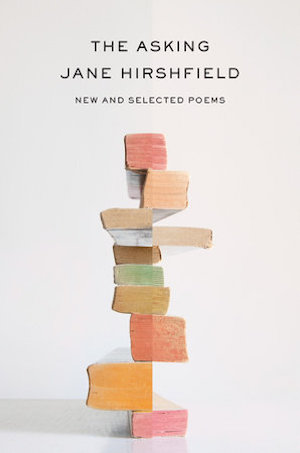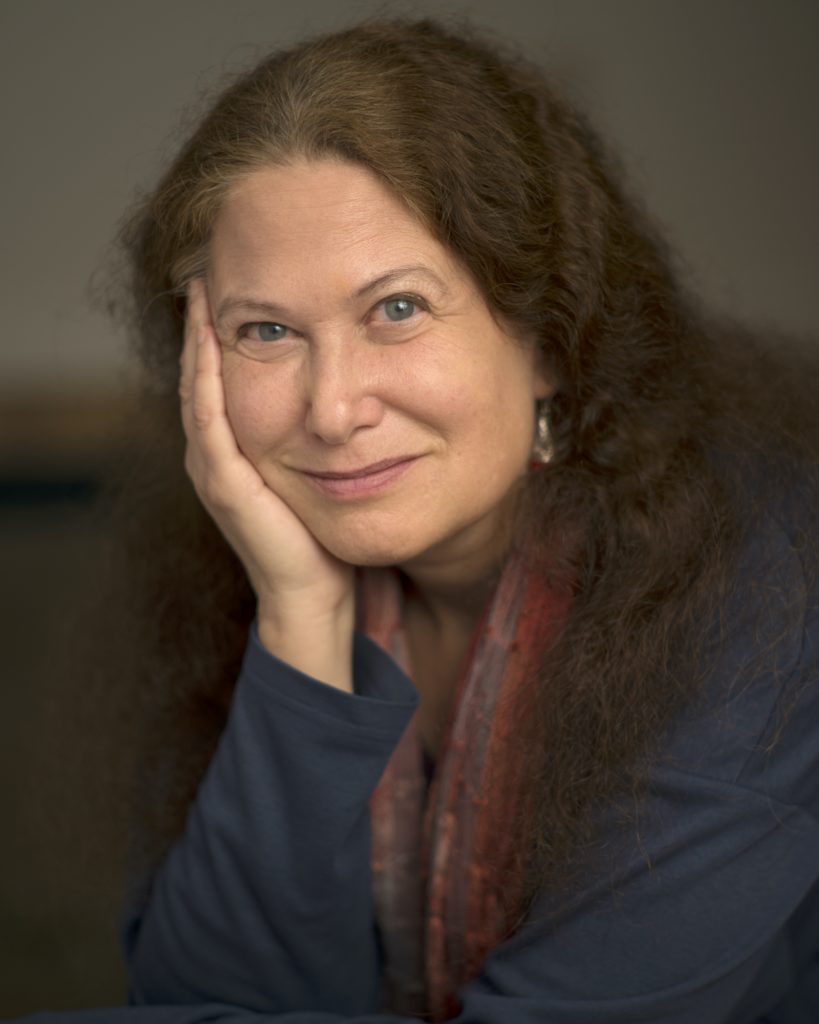A Zen practitioner for nearly fifty years and one of America’s most celebrated poets, Jane Hirshfield has long been fascinated by the power of unanswered questions. When she first arrived at Tassajara Zen Mountain Center as a student, she was instructed that it was a good idea to always practice with a question. She’s been asking questions ever since.
Both in her Zen practice and in her poetry, she is guided by questions that resist easy answers, allowing herself to be transformed through the process of asking. “There’s always the intention of questioning,” she told Tricycle’s editor-in-chief, James Shaheen. “You say to each moment, ‘Who are you?’ You say to yourself, ‘Who am I?’ You say to each other person that you meet, ‘Are you a buddha? What is your teaching?’”
In her new book, The Asking: New and Selected Poems, she takes up the question, “How can I be of service?,” inviting readers to resist fixity and certainty and instead to dwell in not-knowing. Shaheen sat down with Hirshfield on a recent episode of Tricycle Talks to discuss the questions she’s been asking lately, the role of poetry in the face of injustice, and the liberating power of being no one and nothing. Read an excerpt from their conversation below, along with two poems from her book, and then listen to the full episode.
What are some of the questions you’ve been asking lately? Questioning has always been important to me, and as a practice issue, that goes back to my very first week of Zen practice when I was a guest student at Tassajara. Soto Zen is not Rinzai Zen. One doesn’t work with koans as the main focus of meditation. Stories are told and thought about, but it’s not the central practice. Nonetheless, the teacher suggested that it’s a good idea for you to always have a question in your practice.
Over the years, that central practice question has evolved. For a very long time, it was a question that I actually ended up writing about in a special section for Tricycle, which was “What is the emotional life of a Buddha?” I looked at that question for many years until I felt that I had saturated myself in it and come up with my own answer. And then I had to find a new question. The new question of the last quite a few years is one that I think is widely shared, which is “How can I be of service?” How can I serve? How can I help? What can I do? How can I add my one molecule to the tiller of change?
You write that from your earliest work, you have investigated justice. So how do you understand justice? And how do you view the role of the poet in the face of what you call failures of justice and compassion? Poetry can be used in many ways for many purposes. I don’t want to pretend that it is an act that always includes interconnection and empathy and all of the values that those on the path of practice are trying to raise in one another and in ourselves. There are war poems. There are angry poems. There are silly poems, which might be more neutral. But for me, when I look at how poems work in our lives, I see that in their very fabric, there is empathy and interconnection. The very act of entering another person’s language and hearing it inside yourself as if it were your own is an act of permeability and a recalibrating sense that we are not separate from one another.
If you read a line about a mountain, you cannot understand the mountain without becoming it for an instant within yourself or becoming the creature walking on the mountain and feeling that steepness in your legs and seeing the sharpness or smoothness of the surfaces and seeing the many beings who are inhabiting the mountain with you. To actually participate in any work of art is to lower the barricades between yourself and other beings. And so poetry, by its own fabric of what it is and how it works, is already an act that moves the psyche toward the values of practice, the hopes of practice, the vows of practice.
For me, every poem I write is an act of trying to discover a larger and changed and new way of seeing in the face of the evidence and experience of existence. Many poems are written when I feel inadequate—they’re written out of grief and the sense of my own impotence before the disaster that we are all witnessing. The question is, “What can I do?”
Because I am a poet, I can do a few things. My daily practice for many years was to take some political action every single day having nothing to do with being a poet: donations, sending letters, sending postcards. But then sometimes I get to do something as myself, not just as one more set of hands pitching in. And when I’m doing it as myself, this is what I am: I’m a poet. I’m not a union organizer. I’m not a giver of speeches or recorder of TikToks. And so what I can do is write a poem and make that poem available and say that poem when the opportunity arises and hope that because the poem changed me first, it might help change someone else once it’s been written.
I write poems to change myself. I write them to see more clearly, largely, compassionately, less from the small self and more from the large self. And so those changes are in the poem because they are why it became a poem in the first place, and perhaps someone else reading the poem will go through the same experience and move, for instance, from anger or incomprehension to compassion.
Some of your poems read like imagined rituals or liturgies, like “Spell to Be Said Before Sleep” or “Invocation.” How do you think about poetry in relation to ritual and prayer, and are there any Zen rituals that inspire your writing? A poem is very much akin to a ritual for a rite of passage. I’ve been interested in rites of passage ever since I took an anthropology course in high school and read The Ritual Process [by Victor Turner]. That was kind of a life-changing book for me, not least because it talks about how in any rite of passage, there is a moment when a person is no longer the old self and not yet the new self. They are in a state of threshold and liminality. That idea has informed my life ever since.
The strongest experience of this particular kind of liminality I have known in my own life was a Buddhist rite of passage. When you go to Tassajara to stay there as a practicing student, you do five days of what is called tangaryo. Tangaryo is a ritualized reenactment of the earlier practice where a monk would arrive at the monastery gate and simply sit outside until taken in. There is no form. When you are in the zendo sitting your five days of tangaryo, the only requirement is that you not leave. You stay on your zafu. There’s no kinhin, or walking meditation. There’s nothing but you sitting there, and you are so no one that the year that I was there, they continued to do construction projects in the zendo while we were sitting there.
You just didn’t count. You were no one and nothing. And it was physically almost unbearable because I don’t have a body that was meant to sit with its legs crossed. In all my years in the monastery, I don’t think I sat more than three periods of zazen when I wasn’t in pain. But I adored the experience of being no one. This is a paradoxical thing to say, but it felt such a deeply human thing to not be Jane—to just be this ignored intention, the intention to manage to stay to practice. That was informing and life-changing.
“I find that a really helpful way to go through my minutes and hours and days as a human being is to have my first impulse be not to assert something but to ask something.”
From the ritual of tangaryo, I learned that no matter how hard the pain is, you can survive it. In any period of zazen, part of what is being learned is that whatever your experience is, you can simply stay with it. You need not run away. You need not be frightened. You need not reject it. Your only job is to stay on the meditation cushion and be with it and notice that eventually, something will change because something always changes. I think that was a very good instruction to me for practice and for what it is that I am interested in as a poet, which is to not turn away from anything.
There is a famous sentence from the Roman poet Terence, “Nothing human is alien to me.” I think sitting on the zafu and seeing who visits in all of those hours and weeks and months and years is identical to the practice of writing poetry: you see what arises, and you notice if there’s anything you might want to do to help what arises unfold into something larger and deeper.
And so there’s always the intention of questioning. You say to each moment, “Who are you?” You say to yourself, “Who am I?” You say to each other person that you meet, “Are you a buddha? What is your teaching?” I find that a really helpful way to go through my minutes and hours and days as a human being is to have my first impulse be not to assert something but to ask something.
This excerpt has been edited for length and clarity.
⧫
Counting, New Year’s Morning, What Powers Yet Remain to Me
The world asks, as it asks daily:
And what can you make, can you do, to change my deep-broken,
fractured?
I count, this first day of another year, what remains.
I have a mountain, a kitchen, two hands.
Can admire with two eyes the mountain,
actual, recalcitrant, shuffling its pebbles, sheltering foxes and beetles.
Can make black-eyed peas and collards.
Can make, from last year’s late-ripening persimmons, a pudding.
Can climb a stepladder, change the bulb in a track light.
For years, I woke each day first to the mountain,
then to the question.
The feet of the new sufferings followed the feet of the old,
and still they surprised.
I brought salt, brought oil, to the question. Brought sweet tea,
brought postcards and stamps. For years, each day, something.
Stone did not become apple. War did not become peace.
Yet joy still stays joy. Sequins stay sequins. Words still bespangle,
bewilder.
Today, I woke without answer.
The day answers, unpockets a thought as though from a friend—
don’t despair of this falling world, not yet didn’t it give you the asking
Each Morning Calls Us to Praise This World That Is Fleeting
Each morning
waking
amidst the not-ever-before,
dressing inside the not-ever-again.
Under sunlight or cloud,
brushing the hair.
Not yet arrived
at the end-crimped finish,
drinking coffee
and buttering toast.
Permitted to slip into coat, into shoes,
I go out,
I count myself part,
carrying only
a weightless shadow,
whose each corner joins and departs
from the shadows of others.
Mortal, alive among others
equally fragile.
And with luck—
for days even, sometimes—
this luxury, this extra gift:
able to even forget it.

From The Asking: New and Selected Poems by Jane Hirshfield (Penguin Random House 2023)
Thank you for subscribing to Tricycle! As a nonprofit, we depend on readers like you to keep Buddhist teachings and practices widely available.
